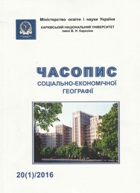Recreational and tourist destination research methods
Abstract
The methodological basis of the concept RTDe are the main provisions of the modern structural and socio-economic geography to study the spatial and temporal aspects of relations in the system "Man - Nature" and related sciences (knowladge about a tourizm, recreational geography, natural resources, etc.) that appeal to spatial heterogeneity of the studied phenomena. In accordance with the established scientific and methodological principles, fundamental circuit and algorithm design-geographical research foundations RTDe system applied research methods in accordance with the objectives of objects and levels of study.
To study and synthesis of theoretical and methodological approaches to determining the conceptual and terminology used RTDe research methods and logical structure and system analysis (structural and geographic analysis); in identifying and clarifying the spatial patterns of differences in territorial organization used methods of space-time analysis; for comparative characteristics of individual properties RTDe and regional level – comparative method; to systematize information, determine the classification categories of types and subtypes RTDe – methods of systematization and classification; to study the history of RTDe, the origin of their individual components and varieties – historical-geographical method; in the present state of research, planning and organizational and functional structure of different types RTDe methods applied field research (conducted in 2006-2013 years.) poll (questionnaire), peer assessment, recording and evaluation of Christian sacred objects for the needs of tourism and recreation, mathematical logic and computer graphics, and other cartographic modeling. At all stages of the research methods used general scientific information analysis, synthesis, systematization, generalization and analogies, verification, comparison and others.
Downloads
References
2. Berlyant, A.M. (1997). Geoinformatsionnoe kartografirovanie. M.: Astreya, 64.
3. Bozhuk, T.I. (2015). Metody doslidzhennya rekreatsiyno-turystychnykh destynatsiy. Region – 2015: strategiya optymalnoho rozvytku: materialy mizhnarodnoi naukovo-praktichnoi konferentsii (m. Kharkiv, 5–6 lystopada 2015 r.). Kh : KhNU imeni V.N. Karazina, 49-50.
4. Gerenchuk, K.I., Rakovska, E.M., Topchiev, O.G. (1975). Polyovi geografichni doslidzhennya. K.: Vyshcha shk., 248.
5. Drotyanko, L.G. (2000). Fenomen fundamentalnoho i prykladnoho znannya (postneklasychne doslidzhennya). K.: Evrop. un-t, 424.
6. Isachenko, A.G. (2004). Teoriya i metodologiya geograficheskoy nauki. M.: Akademiya, 400.
7. Konishcheva. N.Y., Kushnirovich, N.O. (1999). Metodychni pidkhodi do otsinky sotsialnykh, ekonomichnykh ta ekologichnykh naslidkiv rozvytku turyzmu. Turystsko-kraeznavchi doslidzhennya. K: ChP Karmalita, 2, 165-167.
8. Kuzyk, S. (2010). Teoretichni problemy turyzmu: suspilno-geografichnyi pidkhid: monografiya. Lviv: Vydavnychyi tsentr LNU im. Ivana Franka, 254.
9. Kuzyk, S.P., Kasyanchuk, Z.O. (1993). Otsinka turystychnoi prydatnosti terytorii Karpat. Karpaty. Ukrainskyi mist v Evropu: problemy i perspektyvy: tezy dop. Mizhnar. nauk.-prakt. konf. Lviv, 100-103.
10. Danilchuk, V.F., Aleynikova, G.M., Bosunovskaya, A.Ya., Golubnichaya, S.N. (2003). Metodologiya otsenki rekreatsionnykh territoriy. Donetsk, 321.
11. Rovenchak, I.I. (2006). Kartografichnyi metod v sakralno-geografichnykh doslidzhennyakh. Kartografiya ta vyshcha shkola. K., 11, 213-216.
12. Semenyuk, E.P. (1978). Obshchenauchnye kategorii i podkhody k poznaniyu: Filosofskiy analiz. Lvov: Vyshcha shk., 176.
13. Topchiev, O.H. (2005). Suspilno-geografichni doslidzhennya: metodologiya, metody, metodyky. Odesa: Astroprynt, 432.
14. Farenik, S. (2000). Logika i metodologiya naukovoho doslidzhennya. K.: UADU, 340.
15. Shabliy, O.I. (2001). Suspilna geografiya: teoriya, istoriya, ukrainoznavchi studii. Lviv: LNUt imeni Ivana Franka, 744.




